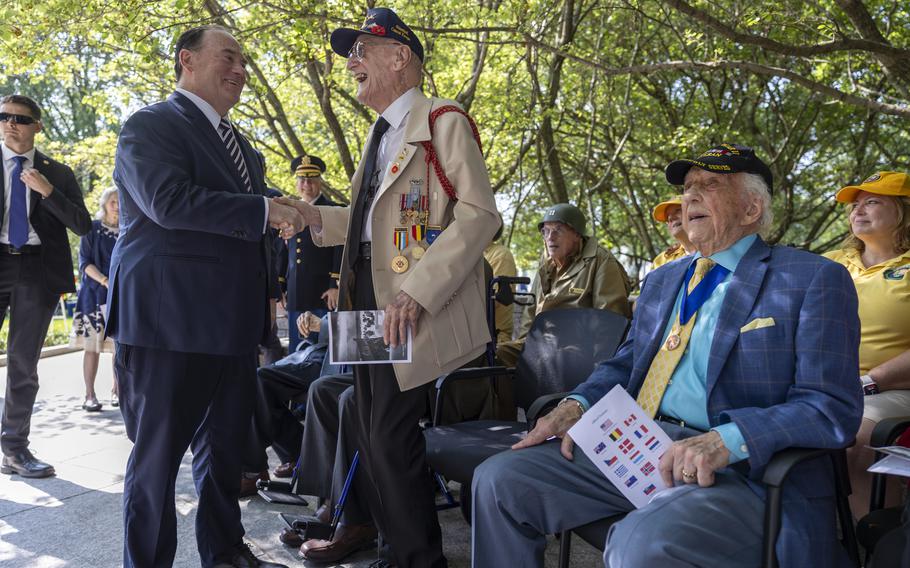
Secretary of the Navy John Phelan, left, greets WWII veteran Harry Miller during a public ceremony at the World War II Memorial in Washington on Friday, June 6, 2025, to mark the 81 years since 160,000 Allied troops landed along a 50-mile stretch of heavily-fortified French coastline to fight Nazi Germany on the beaches of Normandy, France. (Eric Kayne/Stars and Stripes)
WASHINGTON — Four World War II veterans joined by a small crowd gathered Friday near the World War II Memorial to recognize the 81st anniversary of D-Day.
“Today and every sixth of June, until the end of time, we should give thanks,” author and historian Alex Kershaw said. “And we should vow to protect that greatest of treasures bought with the blood of so many heroes from the Allied nations.”
More than 2 million Allied soldiers, sailors, pilots, medics and others from a dozen countries were involved in Operation Overlord, the codename for the Allied invasion of Normandy, France during World War II that began with the assault on June 6, 1944 — D-Day.
More than 225,000 Allied troops were killed, wounded, or declared missing during the invasion, including more than 9,000 who were lost or wounded in the opening hours of D-Day, said Jane Droppa, who is the chairwoman of the nonprofit organization Friends of the National World War II Memorial. The operation lasted for nearly three months, stretching from storming the beaches on June 6 until the liberation of Paris in late August.
“Their legacy is a powerful reminder of what we can achieve when we come together with purpose and resolve,” Droppa said. “Let us share their stories. Let us carry their values — freedom, justice and courage — into the future. Let us never forget.”
Less than 1% of those who fought in World War II are alive today, Kershaw said.
Four veterans from the war attended the celebration. Each veteran’s time of service was read during the ceremony and the crowd applauded for their efforts. Navy Secretary John Phelan attended the ceremony and took time to speak with each of the veterans before and after the event.
Anthony Grant, 105, was drafted into the Army in 1942 and served in a segregated unit during the war. Assigned to the 534th Quartermaster Battalion, his unit landed in Normandy 10 days after D-Day to support front-line troops. As a logistics officer, Grant was part of the effort to help sustain Gen. George Patton’s Third Army through France and the Battle of the Bulge.
Grant later served in Korea, rising to the rank of major, before retiring in 1963.
“Thank you for coming. I’ve got to get some of your genes,” Phelan told Grant.
Frank Cohn, another World War II veteran at the ceremony, was born in 1925 in Breslau, Germany — now Wroclaw, Poland. He came with his family to the United States in 1938, fleeing Nazi persecution.
Cohn was drafted into the Army and served in the Battle of the Bulge, the Rhineland, and Central Europe campaigns, and met Russian forces at the Elbe River. He was later assigned as sergeant of the guard during the second Nuremberg trial.
Cohn became a colonel and went on to serve for 35 years in the Army, including tours in Korea and Vietnam.
Harry Miller also was at the ceremony Friday. At 16, he fought in the Battle of the Bulge with the 740th Tank Battalion, attached to the 82nd Airborne. He went on to serve in Korea and Vietnam, retiring in 1966 as a senior master sergeant in the U.S. Air Force.
Miller still spends hours at the memorial in Washington sharing stories of service and sacrifice with visitors from around the world. He spoke to the Navy secretary about visiting the Pentagon.
“We can sneak you in,” Phelan joked. “Come see me at the Pentagon. We’d love to have you.”
The fourth veteran to take part in Friday’s ceremony was Dave Yoho. He joined the U.S. Merchant Marine in 1944 at 16. He was assigned to a T-2 tanker refueling Allied ships in combat zones across the South Pacific. The war ended in August 1945, just four days before Yoho’s 17th birthday.
“We sometimes forget that you can manufacture weapons and purchase ammunition, but you can’t buy valor. And you can’t pull heroes off an assembly line,” Kershaw said, reading to the crowd the words of Sgt. John Ellery, who served in the 16th Infantry Regiment.